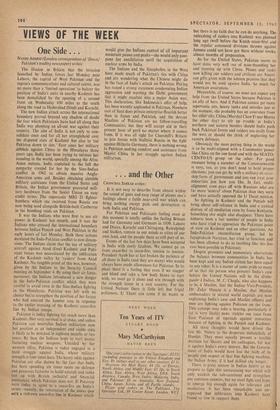. . . and the Other
CHANCIIAL SARKAR writes:
It is not easy to describe from almost within the sound of guns and easy range of planes one's feelings about a futile near-civil war which can, bring nothing except pain and destruction to both India and Pakistan.
For Pakistan and Pakistanis feeling even at this moment is totally unlike the feeling Britons had for Germany and Germans in 1939. Lahore and Dacca, Karachi and Chittagong, Rawalpindi and Sialkot, remain in our minds as cities of our own land, and the people there as still part of us.
Events of the last few days have been accepted in India with steely fatalism. We cannot go on from cease-fire to cease-fire, tension to tension. President Ayub has at last broken the patience of all those in India (and they are many) who would always have made allowances for Pakistan. In its place there is a feeling that even if we stagger and bleed and take a few body blows to start with, we must go it alone and win through with the strength latent in a vast country. For the United Nations there is little left but frigid politeness. U Thant can come if he wants to but there is no faith that he can do anything. The unleashing of raiders into Kashmir was planned long ago (well before the Kutch cease-fire) and the regular armoured divisions thrown against Jammu could not have got there without weeks, almost months of preparation.
As for the United States, Pakistan seems to have done very well out of nose-thumbing her and teaming up with China. Planes and tanks now killing our soldiers and civilians are Ameri- can gifts given with the solemn promise that they would not be used against India. So much for American assurances.
Meanwhile, of course, we must not expect any help from the United States because Pakistan is an ally of hers. And if Pakistan cannot get more supersonic jets, heavy tanks and missiles just at the moment, She probably has an assurance from her other ally, China (Marshal Chen Yi met Bhutto the other day) to stir up trouble in India's northern and eastern borders should India push back Pakistani forces and raiders too easily from the west or should she think of neglecting her eastern defences.
Obviously the most paying thing in the world is to be multi-aligned with a Communist power like China on the one hand and with the SEATO- CENTO-US group on the other. For good measure being a member of the Commonwealth is easy, too, as you don't need to hold proper elections; you can get by with a military dictator- ship form of government and you can treat your minorities just how you like. In fact, multi- alignment even pays off with Russians who are far more 'neutral' about Pakistan than they were and have actually opposed the U Thant mission.
So fighting in Kashmir and the Punjab will bring about self-reliance in India and a cynical distrust of all mediation even by Jomo Kenyatta. Something else might also disappear. There have hitherto been a fair number of people in India who have tried to appreciate the Pakistani point of view on Kashmir and on other questions. An Indo-Pakistan reconciliation group, led by Jayaprakash Narayan, has tried to function and has been allowed to do so (nothing like this has ever been possible in Pakistan).
Despite pressures and momentary aberrations the balance between communities in India has been kept and any Indian citizen has been equal to any other. It is a matter of some pride to many of us that the person who presents India's case before the United Nations will be the distin- guish! 1 Indian, M. C. Chagla, who also happens to IN, 11. Muslim, that the Indian Vice-President, Dr. Zakir Husain is a Muslim, that Muslim ambassadors in several world capitals are now explaining India's case and Muslim officers and men are fighting against Pakistan on the front. This concept may take a beating, particularly if (as is very likely) news trickles out soon from East Pakistan of reprisals against minorities because of fighting in the Punjab and Kashmir.
All these thoughts would have driven the late Mr. Nehru to the desperate melancholy of Hamlet. They must equally present a terrible decision for Shastri and his colleagues, for war is against India's every interest. But the Govern- ment of India would have lost the faith of its people and respect of that fine fighting machine, the Indian Army, if it had dallied any longer.
There is great sorrow in Indian hearts as we prepare to light this unreasoning war which will only weaken the .sub-continent and strengthen our common enemies, but we must fight and hope to emerge big enough again for tolerance and secularism. It has been remarkable and un- expected that infiltrators into kashmir have found so few to support them.


































 Previous page
Previous page